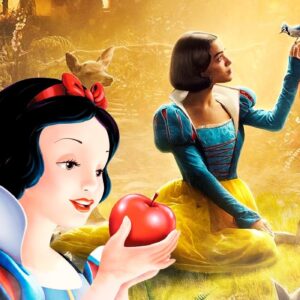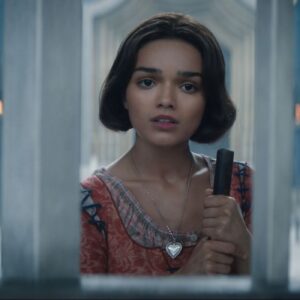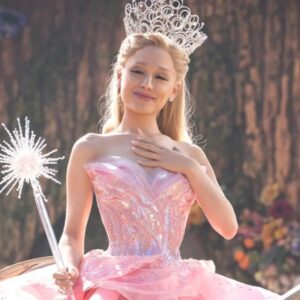“The Boys” and other TV series imagine fascism coming to America, whether wrapped in the flag or in a superhero’s tights.

What would fascism look like in America? A quote long misattributed to Sinclair Lewis says that it would come “wrapped in the flag and carrying a cross.” The comedian George Carlin said that it would come not “with jackboots” but “Nike sneakers and smiley shirts.”
“The Boys,” Amazon Prime Video’s blood-spattered, dystopian superhero satire, has another proposal: It would be handsome, jut-jawed and blond. It would wear a cape. And it would shoot lasers out of its eyes.
Homelander (Antony Starr) is the star-spangled, nihilistic and enormously popular leader of the Seven, a for-profit league of superheroes produced through bioengineering and drug injections by Vought, a corporation founded by a Nazi scientist. To the public, he is the chiseled personification of national virtue. Behind the scenes, he is a bully, a murderer, a rapist — and, as of the new season, possibly America’s imminent overlord.
Image

In Season 4, Homelander goes on trial for murdering an anti-supe protester. He runs ads asking for help against “his toughest opponent yet: Our corrupt legal system.”Credit…Amazon Studios
In the bizarro America of “The Boys,” “supes” are only incidentally crime fighters. They’re valuable corporate I.P., pitching products, starring in movies and reality shows and lending their images to puppet shows and holiday ice pageants. They’re the world’s biggest celebrities, towering on billboards and omnipresent on Vought’s media platforms, and this gives the Seven a power greater than any super-speed or heat vision.
When the series begins, however, Homelander is limited, by politics — the government has resisted using supes in the military — and by his deep-seated need for love and approval. Power breeds suspicion (“The Boys” takes its title from an anti-supe vigilante group whose exploits it follows), and Vought is constantly monitoring the Seven’s approval ratings and guarding against backlash. Homelander may be invincible, but he still has to answer to corporate.
Over the course of the series, however, his contempt for non-super humans — whom he refers to as “cockroaches” and “toys for our amusement” — takes him to greater extremes. He finds an ally and lover, Stormfront (Aya Cash), a Nazi supe who encourages him to lean into his Übermensch side. He goes on an unscripted rant on live TV — “I’m not just like the rest of you. I’m stronger. I’m smarter. I’m better” — and his approval ratings leap higher than a tall building. This guy may not be politically correct, his base decides, but he tells it like it is!
By Season 4, which began last week, Homelander has subdued his rivals and taken effective control of Vought. But it’s not enough. What is a Homelander without control of the homeland? With ambitions of remaking the country — into “something better. Something purer. Cleansed” — he enlists another supe, a Detroit-based brainiac named Sister Sage (Susan Heyward), to draw up a plot for the collapse of American democracy. It’ll be child’s play, she says. “The people will tear it apart themselves. You’ve just got to nudge them a little. Then you get to swoop in.”
Image

Among Homelander’s allies are Sister Sage (Susan Heyward, left) and Firecracker (Valorie Curry), who exhibits many obvious parallels to Representative Marjorie Taylor Greene. Credit…Jasper Savage/Prime Video
“The Boys” is not coy about its parallels with current politics and former President Donald J. Trump in particular. The new season opens the night of a presidential election, the plot building toward the certification of electors on Jan. 6. Homelander is on trial (for murdering an anti-supe protester) and running ads for a legal-defense fund that asks for help against “his toughest opponent yet: Our corrupt legal system.” His followers accuse his critics of pedophilia. His trial draws demonstrations that turn violent, and he tells his unruly supporters, “You are all very special people.” He could laser-vision someone in the middle of Fifth Avenue and not lose any support.
After 9/11, series like “24” and “Homeland” grappled with the threat of terrorism and the morality of the response to it. (“The Boys,” indeed, originated as a comics series by Garth Ennis and Darick Robertson that sent up Bush-era War on Terror jingoism; its TV developer and showrunner, Eric Kripke, has refit its themes for the era of the alt-right.) Today, with illiberal authoritarians rising worldwide and drawing praise from American politicians and media figures, the threat to democracy is just as timely a subject.
But the shriveling of democracy is harder to dramatize for TV than a ticking bomb. The term “fascism” itself is not just loaded but nebulous. Umberto Eco called it “a beehive of contradictions”; the historian Ian Kershaw has said that defining it is like “trying to nail jelly to the wall.” Those who have tried anyway tend to describe less a set of policies than a mode of action, even an aesthetic, that prizes nationalism, strongmen (and often a cult of virility) and the glorification of violence.
This may be what makes a superhero satire a fitting genre to capture it. “The Boys” isn’t a treatise; it’s a vibe. It communicates on an instinctive, blood-and-guts level, not through “West Wing”-like dialogues on policy. It is foremost a raunchy and gleefully gross entertainment, leaning into splatter and dark comedy, supe orgies and octopus sex. (The Deep, an amphibious member of the Seven played by Chace Crawford, has a more complex relationship with marine life than Aquaman.) The series does not attempt a textbook definition of fascism; it just plunges its fist through your chest and trusts you’ll get the point.
Fascism in America, if it ever came, might not fly in wearing a cape. But it might well trade on American images of virility, of superiority, of bigness, of winning. It would have a style, and that style might well be kitschy, loud and as unmissable as the logo on a superhero’s chest.
Fascists have long been entwined with superheroes, providing a reliable source of villains for patriotic stories since Captain America decked Hitler. The Marvel universe more recently used the Nazi-like Hydra organization as a multiheaded big bad.
Even in a polarized time, you can generally get people to agree that Nazis are rotten. But agreeing on what the fascist impulse is and where it lies today — that gets trickier. One irony, which “The Boys” sometimes explores and other times simply embodies, is that superhero stories often cater to the same fantasies that authoritarian movements do: a strong hand to protect you from predators; swift, extrajudicial street justice; powerful leaders who can act unilaterally; the simple thrill of watching an enemy be obliterated.
You can see this in the right-wing extremists who fetishize the character and skull insignia of Marvel’s Punisher, an ex-military vigilante created in the Dirty Harry 1970s, who was played by Jon Bernthal on Netflix. Alan Moore, the writer of the super-antihero graphic novel “Watchmen,” has called the fascination with superhero movies “a precursor to fascism.”
“Watchmen” itself played with the dangerous allure of superpower, through its masked vigilante character Rorschach; through its super genius Ozymandias, who committed mass murder in the name of idealism; and through the godlike Dr. Manhattan, whose powers helped America subjugate Vietnam and ushered in the extended presidency of Richard Nixon.
The 2019 reimagining of “Watchmen” for television, created by Damon Lindelof (“Lost,” “The Leftovers”), extended this story and further complicated it. It begins three decades into the presidency of Robert Redford, Nixon’s successor, who has instituted a regime of gun control and racial reparations, leading to a backlash by Rorschach-masked, racist terrorists. Be suspicious of saviors, it says, and of those who offer to save you from the saviors.
Image

In series like “The Handmaid’s Tale,” crises become opportunities for authoritarian regimes.Credit…Sophie Giraud/Hulu
Outside the superhero genre, some series have offered the small comfort of imagining that only a catastrophe could tilt the country into dictatorship. In “The Man in the High Castle,” Nazism is imposed on America by conquest, though some citizens take to it eagerly. In “The Handmaid’s Tale,” a Christian nationalist dictatorship seizes power after, first, an infertility crisis and, second, a false-flag attack — though the series hammers home the point that the patriarchy was always there, waiting for an excuse to strike back.
Even zombie series like “The Walking Dead” and “The Last of Us” imagine authoritarian governments or statelets emerging in the postapocalypse (suggesting, maybe, why it’s so attractive for authoritarian movements to describe the moment in apocalyptic terms).
In the real world, democracies tend to die not from zombie plagues but rather from more natural causes. HBO’s corporate soap “Succession” was not a drama about fascism per se, but it was maybe more powerful for focusing on the suits while the jackboots were being polished in the background.
In the endgame of “Succession,” the Roy family media business — which, like Vought, is a font of theme parks, tent-pole movies and xenophobic, conspiracist cable news — endorses and ushers to power the Nazi-curious presidential candidate Jeryd Mencken (Justin Kirk), whom the family business thinks will “play ball,” much as Vought thinks it can leash Homelander. He becomes the presumptive winner after a trove of Milwaukee ballots is incinerated on election night, in a fire apparently set by a group of supportive brownshirts.
Arson may have been the means of Mencken’s ascension, but “Succession” implies that the Roys supplied the cultural tinder: a population fed empty cultural calories and hate-fuel while growing ever more alienated by economic inequality (represented by the Roys) and hopeless about political leaders (represented by an unseen, aging president dismissively referred to as “the Raisin”). Where do they turn? To a guy who will at least shake things up, who promises “something clean … something pure.”
We rarely see those voters, however, from the corporate-jet altitudes of “Succession.” They’re sticky throngs at theme parks, staff at restaurants, protesters on streets. The best recent depiction of how American autocracy would play out at home remains “The Plot Against America,” David Simon’s 2020 adaptation of the Philip Roth novel.
The premise of “Plot” is chilling enough: The aviator and isolationist Charles Lindbergh wins the election of 1940, ushering in an era of Nazi appeasement and state-sanctioned anti-Semitism. But its true terror is in the intimacy of its portrait.
Fascism, here, is not simply about national or global politics. It’s losing your job because you spoke up. It’s getting harassed at a restaurant by a bigot who feels newly empowered. It’s getting beat up by thugs in the street while the police look the other way. The authoritarian shift might happen in Washington, but it would be lived in towns across the country, under a thousand little tyrannies embracing the small-scale politics of bossism.
Image

In “The Plot Against America,” Ben Cole, left (with John Turturro), plays the aviator Charles Lindbergh, who wins the election of 1940, ushering in an era of Nazi appeasement.Credit…Michele K. Short/HBO
“The Boys” is hardly as historically grounded as “Plot” or as sophisticated as “Succession.” It slicks its politics in comically outsized gross-out violence. (Its characters include a supe and vice-presidential candidate whose power is to pop people’s heads like balloons; in one action scene, characters drive a boat through a whale.) Its satire is as subtle as Thor’s hammer; Season 4 introduces the Homelander ally Firecracker (Valorie Curry), an “alt-supe” demagogue whose parallels to Representative Marjorie Taylor Greene are bludgeoningly obvious even before she mentions “Jewish space lasers.”
It might, however, be just the dumb show necessary to capture dumb times. Maybe what it takes to depict visceral political arguments is, well, viscera; maybe you have to fight blood and soil with blood and guts.
Whatever its flaws, the series’s biggest strength is simply its boldness — its willingness to prod America’s sore spots like a boat crashing through a whale — where more tasteful dramas have moved elliptically. The news drama “The Morning Show” dealt with the Jan. 6 attack but mainly as the personal crisis of an anchor whose brother was among the Capitol invaders; the latest season of “Fargo” treated authoritarianism as small-town parable, through a corrupt sheriff played by Jon Hamm.
Ultimately stories about superpowers are stories about power, period. Spider-Man popularized the proverb “With great power comes great responsibility.” “The Boys” counters that if absolute power corrupts absolutely, then superpower corrupts superbly.
Homelander may or may not ultimately triumph. (“The Boys” has been renewed for a fifth and final season.) His flaws might be his undoing: vanity, stubbornness, narcissism and a weakness for surrounding himself with yes men.
But he is, for the moment, ascendant. Like many a would-be autocrat, he has come to realize that the rules that constrain him are nothing more than norms. And norms, whether for a supe or a mere human, are easier to bend and break than steel bars.a


